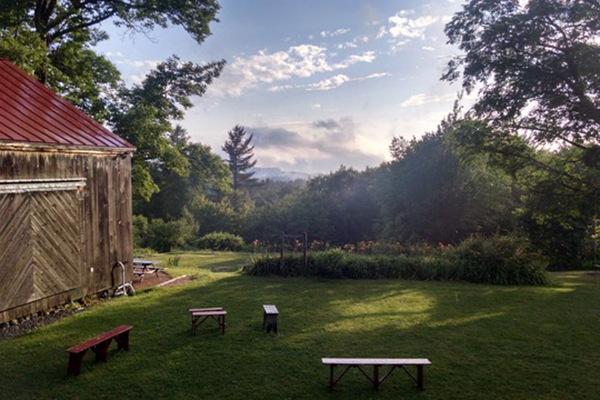Apple Hill Center for Chamber Music sits on 100 pastoral acres in the small New Hampshire town of Nelson. Originally a sheep farm, the location was acquired in 1971 by Boston area-based cellist and music teacher Gene Rosov, who had a dream to start a music camp for his students.
What started as a small school and summer camp mostly serving local students, the program “has grown so much in 50 years,” says Lenny Matczynski, director at Apple Hill. Apple Hill now serves a population of 300 students and 50 faculty in 41 buildings.
Fundraising is crucial to the mission of Apple Hill. The number of students at Apple Hill is directly related to fundraising success. “It’s about affordability,” says Lenny. “How many can we afford to have on scholarship? So it’s always about building funds, raising money.”
Apple Hill is about the music, but perhaps even more crucially, it’s about the people. Orchestra programs are often exclusive—they’ll have all high school students, or only over-60 amateur adult players, or music students who are on track to become professionals, for example. At Apple Hill, there are all ages working together, from 12 to 80 years of age. From beginner to professional to adult, anyone who wants to take up an instrument is welcome at Apple Hill.
“Here at Apple Hill, everybody is together. And that’s unusual,” says Lenny. Apple Hill’s mission, “to perform, teach, and create chamber music at the highest standard, broaden the appreciation of chamber music through the development of educational programs, and cultivate connection and understanding among people of diverse backgrounds, cultures, playing levels, and ages through the Playing for Peace program,” isn’t just words on paper. It’s a way of life.
As part of their effort to cultivate connections among people of diverse backgrounds, in 1988 Apple Hill founded Playing for Peace, a program that brings musicians from areas in political conflict together to play chamber music. Playing for Peace has joined musicians from opposite sides of conflicts in Ireland, the Caucasus, Southeast Asia, and the Middle East. Apple Hill staff travel to these areas and award scholarships for music students to come to Apple Hill. Once at Apple Hill, these students are organized in small groups to play together, “Because that’s what chamber music is—small groups of people,” notes Lenny. Apple Hill becomes a neutral space for people from cultures in conflict to learn to work together. “It’s a pretty powerful program,” says Lenny. “They learn how to do something together.” After 30 years, Playing for Peace has expanded its reach, now bringing together communities that have been underrepresented or underexposed to classical music, separated by racial or ethnic discord, or with gender, orientation, religious, age, or playing level differences.
Lenny has been with Apple Hill for 11 years, first as a member of the faculty and then in 2008 as Artistic and Executive Director. He’s seen firsthand the joy that comes from gathering people together to produce music. Every Tuesday, Apple Hill puts on a concert that is open to the public and afterwards, they serve a buffet meal. All combined, that’s 14,000 meals every summer in a kitchen and dining area that was never meant for that capacity.
Beginning this fall, work will begin to upgrade the central campus, including an expanded kitchen, decks for people to eat on, accessible bathrooms, new mechanicals and storage in the basement, and upgrading and modernizing equipment.
“One thing that’s really wonderful about Mascoma Bank and their gift to us is that, yeah, it’s about the building project, but it’s really about diversity,” says Lenny. It’s about the people.
We at Mascoma Bank are thrilled to be a part of the good work being done by nonprofit organizations like Apple Hill Center for Chamber Music and invite you to join us in supporting groups that make our communities healthier and happier. Visit the Apple Hill donations page for more information.
